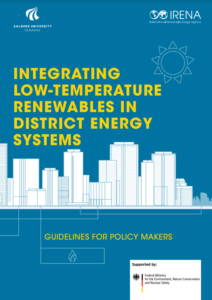Full Title: Integrating low-temperature renewables in district energy systems: Guidelines for policy makers
Author(s): International Renewable Energy Agency (IRENA), Aalborg University
Publisher(s): International Renewable Energy Agency (IRENA), Aalborg University
Publication Date: March 12, 2021
Full Text: Download Resource
Description (excerpt):
Reducing the heating and cooling sector’s emissions is critical to mitigating the effects of climate change and reducing air pollution. District heating and cooling systems can assist in scaling up renewable energy use, decreasing the utilization of fossil fuels in the heating and cooling sector, and improving urban air quality.
District heating systems have been built to run at high temperatures to meet the demands of poorly insulated buildings. In most cases, this necessitates the use of fossil fuels. However, technology innovation, digitalization and current trends towards more energy-efficient buildings may enable the broader deployment of clean energy technologies – such as low-temperature geothermal, solar thermal, or energy from water bodies or low-temperature waste heat sources – in the new generation of district energy systems. These sources are widely available at the local level in many regions. Still, they remain largely untapped because they are not immediately compatible with current district energy infrastructure and existing building stock.
This guidebook by the International Renewable Energy Agency (IRENA) and Aalborg University (AAU) provides information for policy makers and examples of available tools and solutions to facilitate the use of low-temperature renewable heat sources in new and existing district energy systems. An overview of applications and enabling technologies for district heating and cooling utilizing low-temperature renewable energy is also presented.
